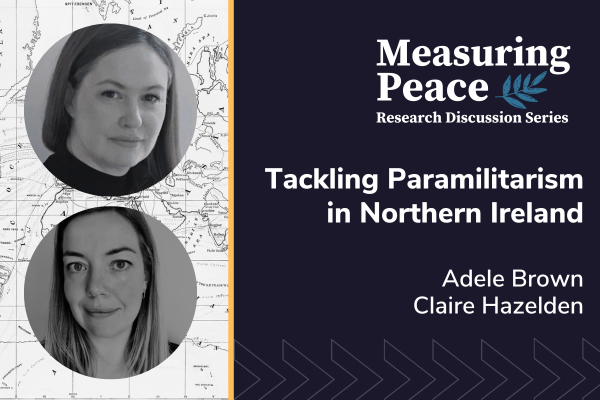
This program is co-sponsored by the Mershon Center for International Security Studies, Corrymeela Community, Northern Ireland Executive, Ulster University, and University of Bradford
Peace is "troubled" in Northern Ireland. Twenty-five years after the Good Friday Agreement, violence remains pervasive throughout the six counties. Youth report endemic violence as generating the most significant adversity in their daily lives. Between 20-50% of people in Northern Ireland are affected by paramilitarism but, for some of the most disadvantaged communities, exposure is double that of the population average. Why has paramilitarism activity continued to persist in Northern Ireland, how is it affecting youth, and how has the government been responding?
This presentation spotlights NI Executive’s Tackling Paramilitarism, Criminality and Organised Crime Programme, a government sponsored, multi-level action research initiative. Using scientific evidence within a public health framework, a wide range of projects interface to prevent violence, tackle paramilitarism, and contribute to the UN Sustainable Development goals. This seminar is especially relevant for researchers interested in learning how academic research can inform government policy and help shape practical interventions.
For examples of TPP's research and policy frameworks, see the following reports below:
Speakers

Adele Brown is the director of the NI Executive's Tackling Paramilitarism, Criminality, and Organised Crime Programme

Claire Hazelden is the research analyst for the Programme
About Measuring Peace
Is peace measurable? This presentation series brings together researchers, practitioners, and policy specialists across disciplinary backgrounds to explore the diverse and myriad ways in which peace is defined and studied.
Working from an internationally recognized Peace Studies paradigm rooted in the social sciences, Measuring Peace is premised on the belief that durable peace requires more than the absence of active conflict and violence. Rather, an enduring “positive peace” must be collaboratively cultivated through multi-level interventions on local, national, and global scales. Peace-building processes are therefore complex, non-linear, and highly fluid, and require comprehensive social, political, economic, and structural strategies.
Featured speakers in this series will present innovative approaches to the study and practice of peace around the world— and how scholarly research and analysis can help to shape effective policy and intervention strategies on the ground. Topics covered during the 2023-2024 series will include identifying micro-dynamic and everyday indicators of peace, tracking peace accord implementation, tackling paramilitarism, and promoting social healing.
Graduate students who attend at least 2 webinars and the all-day Everyday Peace Indicator workshop (https://www.everydaypeaceindicators.org/) with Dr. Roger MacGinty in March 2024 will receive a Mershon Certificate in Measuring Peace.
Guiding Questions for this Series:
- What does it mean to assess peace? What kinds of working definitions and analytical metrics can we set to make “peace” a discrete and measurable research subject?
- Which kinds of inter/disciplinary research methodologies are most generative for doing peace research? What are the benefits and limitations of different models?
- How can we productively speak to and across historically- and geographically-specific cases of violent conflict in order to make broader claims about what it means to achieve peace?
